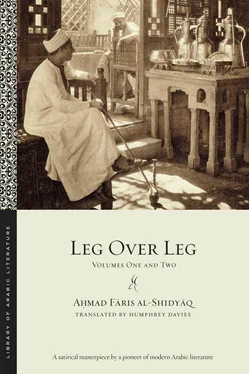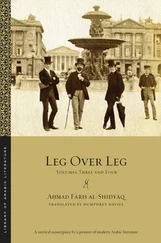2.19.3
His wife’s first thought, once he’d finished the rest of his speech along these lines, was that he was trying by this means to discover her inmost feelings and trap her into making a slip, so she wept with rage and said to him, “You must believe I’m a whore to confront me with such words and hold such a low opinion of me.” “God forbid!” said he. “I spoke to you simply of what nature requires. Think over what I said in a little while and let me know your answer.” The woman left him, scowling and suspicious. A good few days passed and the man neither fondled her nor mounted her nor played with her nor performed his husbandly duties with her. She, becoming worried when the situation promised to persist , was too annoyed to have the patience to desist , and started thinking about what her husband had said to her. One day, then, she dressed herself in the clothes that pleased him best, made up her face, put on perfume, and set off for his room, telling herself, “Today will be the watershed , the dividing line between what’s past and what lies ahead . If he doesn’t treat me like a wife, I’ll remind him of his words.”
2.19.4
He received her with joy and a beaming face and sat her down at his side, noting that she was aroused, for a redness had suffused her eyes, which glistened, while her voice had a tremolosity, which is to say a shake and a shiver, to it. When she’d settled herself, he started off by asking her if she had thought over what he’d said a few days before. “Yes,” she said. “But don’t you have a bit left that would relieve me of this matter?” He replied, “I swear I don’t have a drop or a pottle , the dregs of a puddle or the lees of a bottle , and I’ve no hope left of improving the situation with any aphrodisiac — not by the rubbing on of flesh of skink or fat of varan, nor by use of ginger or pepper or pan-leaf or saltwort or elecampane or betel-nut or cloves or spikenard or mastic or nutmeg or fennel, or of Spanish pelletory or pinenuts or chickpea or emblic or myrobalans or long pepper or sesame or alpinia or mace or balm-tree oil or ragwort, or in birds’ eggs or in iris oil or in colocassia or in narcissus root steeped two nights in milk or in celery whose seeds have been crushed with sugar and clarified butter or in wearing clothes dyed with Indian yellow or in eating mandrake root or in glasswort juice squeezed into fermented milk or in borax mixed with honey or in oil of jasmine or in Indian hazelnut or in fried hamqāq 659or in terebinth or in burdock resin or in musk blended with gillyflower oil or in salvia root or in carrots or in asparagus or in Indian gooseberry or in mughāth 660fruit or in fava-bean greens with ginger or in cassia ground with sesame and kneaded with honey or in mangrove gum or in bdellium or in terebinth fruits or in being censed seven times with lean meat of the Egyptian vulture mixed with mustard seed or in tigernut sedge or in safflower kernels or in rubbed red sand worms or in bananas or in wiping the soles of my feet with bats’ brains or in pigeon flesh or in cassia bark; otherwise I would have spurned no possibility of making you happy, for the excessive affection that you know I bear you.”
2.19.5
She replied, “If things stand as you say, sir, I choose a priest.” “And what wicked tempter has whispered this utterly evil choice into your ear?” he asked. “Firstly,” she answered, “it’s so that people won’t think badly of me when they see him entering my house every day, and secondly because they say that the priest has vital juices in abundance.” “You err. Also, I fear what effect he may have on my children, for he may try to seduce them into disobeying me, given that I follow a different creed than he. You had better choose someone else.” “You,” she replied, “are a doctor and know the sound from the sick, the strong from the weak. Choose me whomever you please, and with whatever contents you I shall be content.” “God bless you!” he responded. Then he kissed her, so joyful was he, and promised that he would do as he had promised the following day.
2.19.6
Dawn had hardly broken before he was on his donkey and making his way to one of his friends. When he met with him, he told him, “I have a request to make of you.” “Ask away,” said the other. “On condition that you don’t refuse me,” he said. When the other replied, “I shall devote all my effort, God willing, to fulfilling it,” he took his hand to seal their agreement. Then he told him, “I want you to succeed me with regard to my wife.” “Have you decided to quit Egypt and leave your wife behind?” the man asked him. “No,” he said. “You’ll succeed me while I’m still here.” Offended, the man asked, “Has some doubt got into you as to whether I am truly your friend, making you seek covertly to uncover my innermost thoughts and private affairs?” At this, the man made a clean breast of the matter and urged him to go with him. When they arrived, the deal was contracted in the presence of both husband and wife, and everyone was content, the man calling in daily from that time on at “the caliphal palace.” 661
2.19.7
Things went on this way for a while. Then, when the wife grew bored with the man, the way women do — a situation made apparent to him through her showing a lack of enthusiasm at the sight of him on one occasion and making of excuses on another — he in turn divulged her secret to a friend, the way men do. The latter followed the well-beaten path of others of his ilk, started playing court to her, and took the place of the first. Then she grew bored with him, and he told on her, and another came along, and she accepted him, and then another and another, until they’d become a mighty company. At this, her first lovers returned to her too, and she busied herself changing and exchanging until the doctor’s house came to resemble nothing so much as a watering hole. In the beginning, the affair acquired no notoriety with the neighbors because they thought that all those people were coming to be treated for some illness. Later, however, it got out, because the doctor took a second home outside the country in which to spend the summer and left his wife in the first, where the visitors continued to come and go just as before, so people caught on.
2.19.8
Now, at the very time when all these good folk had been turning up to avail themselves of that cold feast, the poor Fāriyāq had been frequenting the doctor’s house to give his son lessons and receive treatment, and, as a result, everyone suspected that he was one of those visitors, a sin they will carry round their necks till the Day of Judgment, 662for he was hors de combat and wasn’t up to doing anything anyway. 663He went on like that for a while without seeing any improvement from the treatment, as though the doctor wanted to drag out the time till he’d finished teaching his son. Consequently, the Fāriyāq cut short his visits, sought treatment with another, and was cured.
2.19.9
While this was going on, he traveled to Alexandria on some business and there met with a righteous Bag-man, who asked him to go back to Cairo with him to teach some pupils in his house, and this he did, though he was interested only because the Bag-men are prompt in paying those who work for them. During this period too, it occurred to him to study prosody, so he embarked on a reading of Sharḥ al-Kāfī ( The Commentary on the Kāfī ) 664under Shaykh Muḥammad. He barely had time to finish the book before plague broke out in Cairo. At this the Lord caused the Bag-man to feel extreme concern for his own life — out of a desire to ensure the preservation of the Bag-men’s interests, as he claimed — and he decided, as a result, to put a little distance between him and the trap that had been dug so he wouldn’t find himself buried inside it, thus resulting in a loss that would have inflicted on other Bag-men like him intolerable grief, which would in turn have led to the loss of yet others, for they hold it as a firm belief that extreme sorrow leads to death. He therefore put the Fāriyāq with the graduate Baguettes plus a clever man who had experience in preventive treatment of the bubonic infection, and then gathered to him his own and fled to Upper Egypt, details to follow in the next chapter.
Читать дальше












